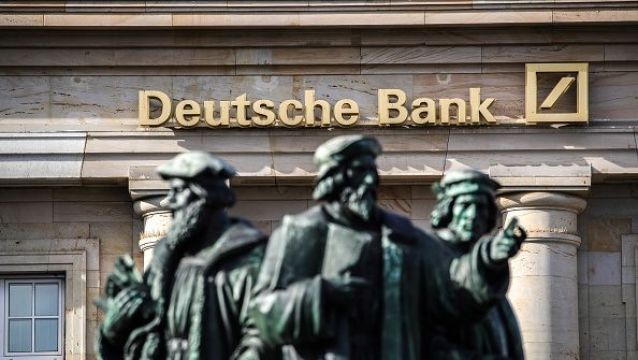Banking stocks fell sharply in Europe on Friday with heavyweights Deutsche Bank and UBS Group hit hard by worries that the worst problems in the sector since the 2008 financial crisis were not yet contained.
German giant Deutsche Bank fell for a third day, sinking more than 8 per cent after a sharp jump in the cost of insuring its bonds against the risk of default.
Its shares have lost a fifth of their value so far this month and its credit default swaps (CDS) - a form of insurance for bondholders - marked their largest one-day rise on record on Thursday, according to Refinitiv data.
Deutsche Bank said on Friday it was redeeming $1.5 billion of Tier 2 notes due in 2028, having issued debt to replace them in February.
The global banking sector has been rocked since the sudden collapse this month of two US regional banks sparked fears of contagion to other lenders.
Policymakers have stressed the turmoil is different from the global financial crisis 15 years ago, saying banks are better capitalised and funds more easily available.
But the worries have spread quickly and on Sunday, UBS was rushed into taking over Swiss peer Credit Suisse after the troubled lender lost the confidence of investors.
Swiss authorities and UBS are racing to close the takeover within as little as a month, according to two sources with knowledge of the plans, to try to retain Credit Suisse's clients and employees.
Separate sources told Reuters that UBS has promised retention packages to Credit Suisse wealth management staff in Asia to stem a talent exodus.
Brokerage group Jefferies cut its recommendation on UBS stock to "hold" from "buy", saying the acquisition of its former rival would change UBS' equity story, which was based on lower risk profile, organic growth focus and high capital returns.
"All these elements, which is what UBS shareholders bought into, are gone, likely for years," it said.
Separately, Bloomberg News reported that Credit Suisse and UBS are among banks under scrutiny in an US department of justice probe into whether financial professionals helped Russian oligarchs evade sanctions.
Credit Suisse and UBS declined to comment, while the justice department did not immediately respond to Reuters' emailed requests for comment.
The index of top European banks fell 2.9 per cent in early trading with British banks losing 2.5 per cent, down for a third straight session.
Deposit protection
The falls in European banking stocks followed losses on Thursday in the United States, where investors were looking to see how far the authorities would go to shore up the sector, particularly fragile regional banks.
For the fourth time in a week, US Treasury secretary Janet Yellen spoke aiming to reassure Americans that the US banking system is safe.
She told US lawmakers that bank regulators and the Treasury were prepared to make comprehensive deposit guarantees at other banks, as they did at failed Silicon Valley Bank (SVB) and Signature Bank
Politicians remain wary, though, of public perceptions that banks are being bailed out again, after anger over the sector's costly rescue in 2008.
The takeover of Credit Suisse has also ignited broader concerns about investors' exposure to a fragile banking sector. The decision to prioritise shareholders over Additional Tier 1 (AT1) bondholders rattled the $275 billion AT1 bond market.
These convertible bonds were designed to be invoked during rescues to prevent the costs of bailouts falling onto taxpayers.
As part of the deal, the Swiss regulator determined that Credit Suisse's AT1 bonds with a notional value of $17 billion would be wiped out, a decision that stunned global credit markets.
Standard Chartered Chief Executive Bill Winters said on Friday the wipeout had "profound" implications for global bank regulations.
He also told a financial forum in Hong Kong the US Federal Reserve move to guarantee non-insured deposits was a "moral hazard".
"I think it had very profound implications for the regulation of banks, and for the way that banks manage themselves," Winters said.
US authorities had invoked "systemic risk exceptions" after the failures of SVB and Signature Bank that allowed them to protect uninsured deposits, including those of wealthy technology executives and cryptocurrency investors. -Reuters







